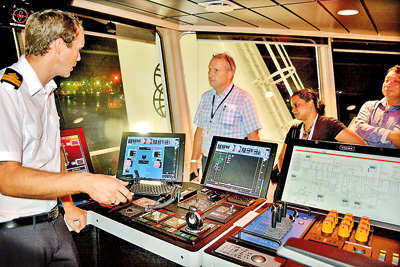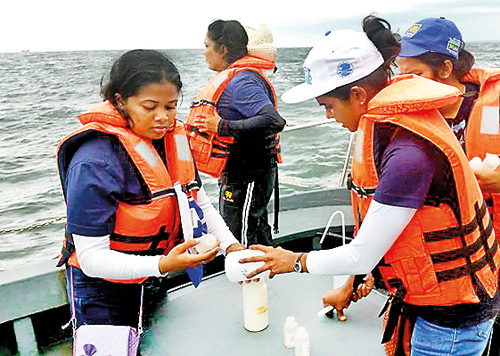News
Create ocean science ‘champions’ to boost nation’s security
Sri Lanka needs to understand how critical the resources of the ocean are to an island nation’s security and end its centuries’-old apathy about protecting its maritime base, leading scientists told a conference.

The state-of-the-art Control room of the Norwegian research vessel Dr. Fridtjof Nansen
“As an island nation, the resources of the ocean are very important for development and changes to ocean patterns can bring bad impacts. Sri Lanka needs to put more effort into developing understanding of the oceans around us through scientific research,” Marine Environment Protection Authority (MEPA) General Manager Dr. Terney Pradeep Kumara said.
Culturally and historically, society had been detached from the ocean and the education system needed to bridge this gap.
“We haven’t realised the importance of coastal zones. For example, most often the cemeteries of villages along the coastal belt are set up adjacent to beaches, proving that, traditionally, Sri Lankan society hasn’t realised the importance of ocean and related ecosystems,” Dr. Pradeep Kumara said.
His comments were made on Ocean Science Day, marked on June 27, organised by the Intergovernmental Oceanographic Commission (IOC) of UNESCO, which is composed of 150 member states, including Sri Lanka.
The head of the IOC’s Ocean Science Section, Dr. Arico Salvatore, said Ocean Science Day – now in its second year – was established to demonstrate that ocean science aids societal goals.
Dr. Salvatore emphasised that countries such as Sri Lanka can benefit greatly from ocean science, particularly with ocean-based weather predictions that allow more effective planning of agricultural and fisheries operations.
“The tsunami warning system is a clear example how the application of ocean science can be used to save lives,” he added.

Ruhuna University's Faculty of Fisheries and Marine Science students conduct research on board Dr. Fridtjof Nansen
Sri Lanka and adjacent countries benefit from the Indian Ocean Tsunami Warning and Mitigation System set up under the IOC’s leadership. At the time Sri Lanka was hit by the deadly tsunami of 2004, the Indian ocean region lacked a tsunami monitoring system. The late Professor Samantha Hettiarachchi was a major contributor to the success of the warning system, which began working in 2006.
“Sri Lanka has a lot of talent that will create champions in the field of ocean science. We are lagging behind in this field so we need to focus on a program to train more scientists in ocean science,” said Dr. Pradeep Kumara, a former head of the Department of Oceanography and Marine Geology at the University of Ruhuna.
Ocean science has evolved rapidly in recent years in response to growing international interest in ocean use, climate change, environmental protection and the conservation of ocean resources, and Sri Lanka needs to ride on this bandwagon and not get left behind, he said.
Dr. Upul Premaratne, Dr Pradeep Kumara’s successor at the university, said the faculty worked hard at producing quality graduates and it was important that job opportunities be created for them to prevent them going abroad where there was high demand – particularly in developed countries – for experts in ocean science and fisheries.
Another University of Ruhuna expert, Senior Professor Ruchira Cumaranatunga stressed the need for more resources. “We need a full-fledged research vessel that can continuously monitor the ocean around our country without us depending on other countries,” he pointed out.
Developed nations such as Norway have been showing Sri Lanka how to use modern technology in fisheries and other ocean sciences. Twenty Sri Lankan scientists were given the opportunity to sail on the Norwegian research vessel Dr. Fridtjof Nansen, which recently surveyed the ocean around Sri Lanka, assessing fish stocks and ecosystems.
The trip provided a novel experience for Sri Lankan scientists to familiarise themselves with the latest technologies, National Aquatic Resources Research and Development Agency (NARA) senior scientist Professor Prabath Jayasinghe, said.

